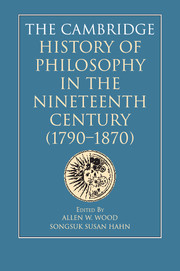Book contents
- Frontmatter
- Contents
- Contributors
- Preface
- Abbreviations
- Introduction
- I Philosophy in the Nineteenth Century
- II Logic and Mathematics
- III Nature
- IV Mind, Language, and Culture
- V Ethics
- VI Religion
- VII Society
- 19 Philosophical Responses to the French Revolution
- 20 The Decline of Natural Right
- 21 Conceptions of Society in Nineteenth-Century Social Thought
- 22 Nineteenth-Century Political Economy
- 23 The Nation-State
- 24 Nineteenth-Century Ideals
- 25 Social Dissatisfaction and Social Change
- VIII History
- References
- Index
- References
23 - The Nation-State
from VII - Society
Published online by Cambridge University Press: 05 December 2012
- Frontmatter
- Contents
- Contributors
- Preface
- Abbreviations
- Introduction
- I Philosophy in the Nineteenth Century
- II Logic and Mathematics
- III Nature
- IV Mind, Language, and Culture
- V Ethics
- VI Religion
- VII Society
- 19 Philosophical Responses to the French Revolution
- 20 The Decline of Natural Right
- 21 Conceptions of Society in Nineteenth-Century Social Thought
- 22 Nineteenth-Century Political Economy
- 23 The Nation-State
- 24 Nineteenth-Century Ideals
- 25 Social Dissatisfaction and Social Change
- VIII History
- References
- Index
- References
Summary
The concept of the nation entered the political arena in the seventeenth and eighteenth centuries. It was used to express a new doctrine of political legitimacy based on a corporate metaphor: that there is, or should be, a body of subjects enduring over generations and changes of government, and that this body is authorized to confirm or reject the basic laws of the land. Since its first appearances in English republican rhetoric, the word ‘nation’ was used to mean a body of people who had ultimate authority or sovereignty over rulers and laws and who possessed in this capacity a moral identity distinct from the state. This distinctness made it possible to think of nations as the source of legitimacy in states. Although some later authors argued that national bodies must be defined by cultural features such as language or religion, the earliest political uses of the term ‘nation’ were open-ended about the characteristics that should distinguish one sovereign entity from another. If the early modern language of nationhood expressed any core idea, it was that polities should ideally be grounded in the authority conferred by a sovereign people who share both a sense of corporate identity with each other and a sense of being distinct from other peoples. The ‘nation’ in nation-state came to imply that states should have a special kind of legitimacy based on an identity among an entire population of a territory, cutting across diverse regions and social groups. A corollary of this idea was that legitimacy should originate in the people or polity, not be imposed from without.
- Type
- Chapter
- Information
- Publisher: Cambridge University PressPrint publication year: 2012



